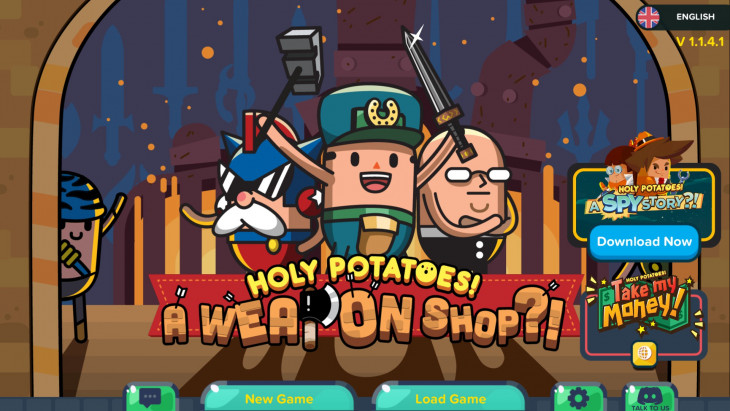
Holy Potatoes! A Weapon Shop?! is a very interesting blacksmith management game. In the beginning you are approached by a person that gives you a blacksmith. He says that he worked with your late grandpa and that you inherited the shop and the 1% your grandpa owned. He will stop by from time to time to take some portion of what you earn by selling the weapons you make.
You start off with three different smiths, each of which are better at different parts of the smith. There are four parts that you will use when making weapons: attack, speed, accuracy, and eventually magic. Each of these are very important as you sell to prospective clients.
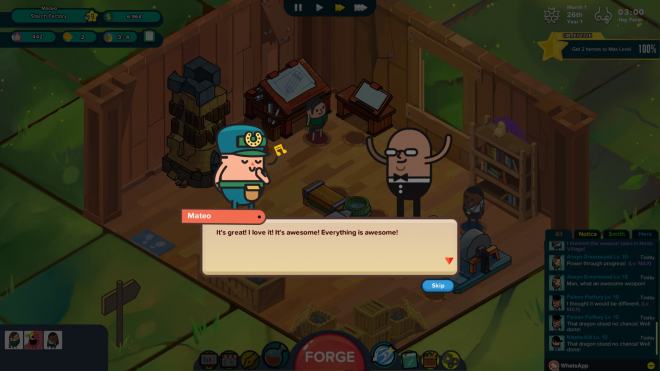
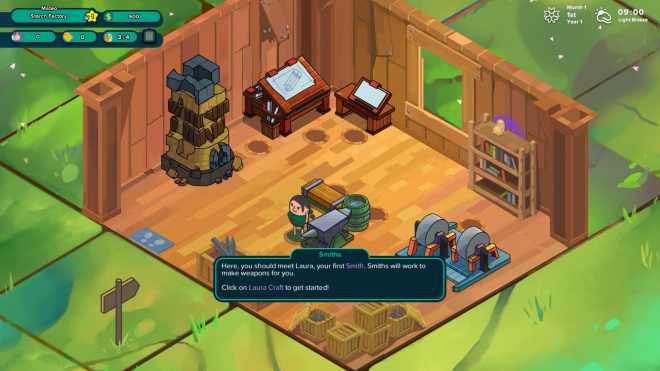
There are a few basic things that are important when forging weapons. You need to know the weapon type and the primary and secondary stat the customer wants. From there you need to manage what you have in inventory, because if you don't have an item on hand you can't make a specific weapon. You can either send someone to go forage for it or go to the market to purchase what you need. The more you send someone foraging, the better they become and the more valuable stuff they return with. The more you send someone to the store, the better merchants they become when buying and selling items. I suggest focusing specific smiths on specific tasks when running errands.
Next, you need to actually forge the weapons. I found that shuffling the smiths around to focus on the primary and secondary stats made a lot of difference when making specific weapons for the customers. Each of the smiths are better than others at some aspects. While one smith may focus on damage, they may also be good with accuracy. When you're making a weapon that prioritizes accuracy over damage, you can shuffle them to add accuracy instead of wasting time adding damage. It adds a little complexity to the game if you want to focus your time on micro-managing your shop. Below you can see that some clients prefer specific items over others.
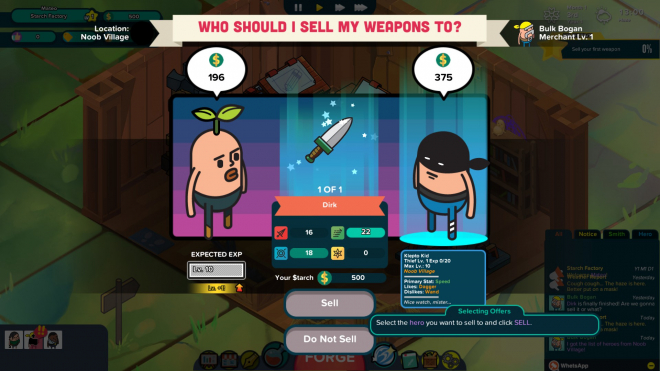
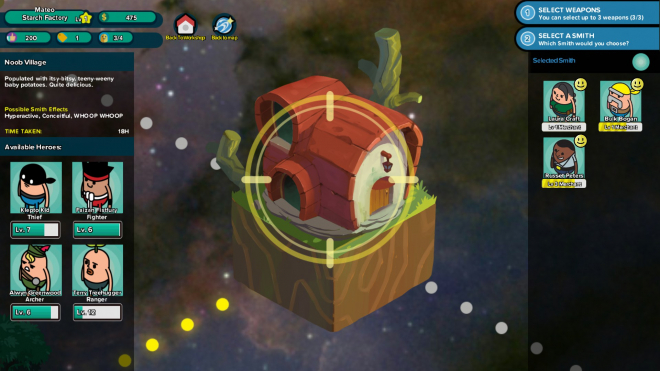
When selling, you'll make specific items for your customers. You can find your customers at specific places on the main map, and you can see which items and aspects they prefer. To maximize the value of the weapon focus on those aspects first, and you'll normally get up to 100x more money per item vs when the customer doesn't want what you're selling.
As you're finalizing the weapons in your shop you have options to boost your weapons and add enchantments to them. Depending on what you're wanting to boost different smiths will add different amounts of boost to the item. Also, when they're happy they'll add more. You'll find that some smiths will not only add the aspect you're requesting, but smaller portions of the other 3 aspects, depending on the secondary strengths of the smiths. Boosts and enchantments definitely increase weapon value.
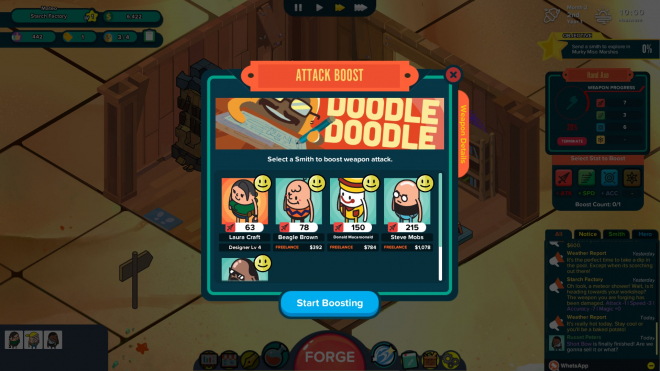
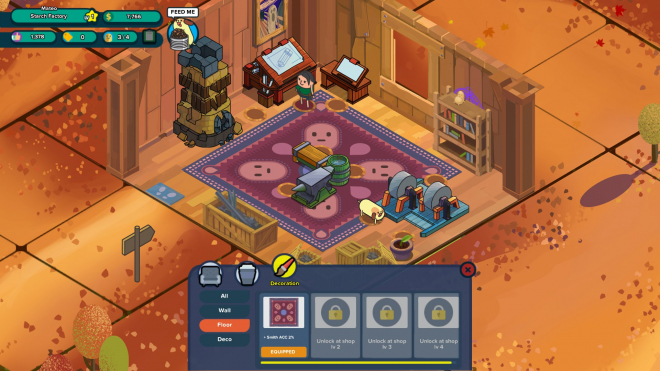
As you get later into the game you'll move to new locations. As you move to bigger and bigger shops you'll be able to upgrade the decorations and crafting stations in the smith itself. Each upgrade will give different benefits. While the basic rug may give 4% magic boost, the next upgrade may add 7% experience gain for the smiths, or 6% additional speed to the weapons. They don't make a ton of difference, but in the long run they do add up. You can also add different amenities for the smiths, like heaters to keep warm in winter, coolers to keep cool in the summer, and coffee machines that help improve smith happiness. The later into the game you get the better the upgrades will be.
As you progress you'll start taking side jobs instead of just making weapons. Aside from buying, selling, and exploring, you can take custom jobs to make something with specific stats within a certain time frame. If you complete it, you get the money. It's an easy way to make quick money without having to do a ton of work. But it doesn't pay off as well as smithing your own weapons and selling them in the markets. You can also research new weapons and make custom weapons for heroes that will visit. Each and every hero that visits is a pun-y take on a character from popular culture (when the game was made). You'll get a few laughs meeting different knock-off potato people based off your favorite characters.
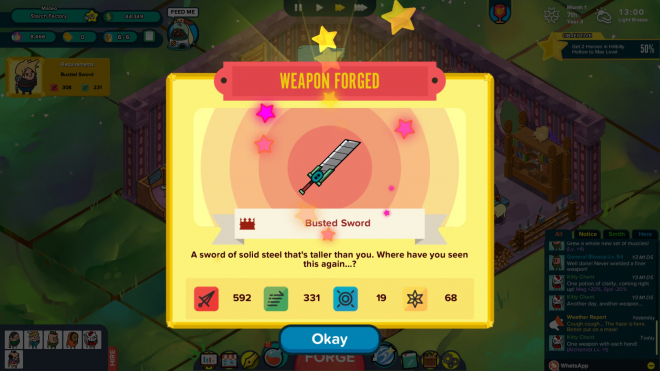
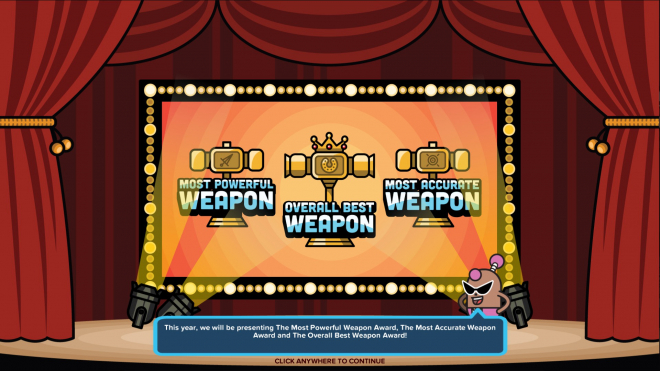
Every so often there will be an award ceremony, where some of the best weapons that were made from different shops will be judged, depending on how good they were. If your weapon makes it into the category, you have the option to bribe judges. But be careful, if you're caught you'll be disqualified. Near the end of the game you'll end up taking every award by a landslide, and the rewards are decent, though not super impressive. It's a fun way to break up the monotony.
In the endgame it becomes a game of numbers, and how high you can make them. With each new shop upgrade you'll be able to hire better and better smiths to help in the shop. You'll come across different custom or hero smiths that you can hire if you so want. Sometimes it's not worth firing the current smiths you have to make room for the new ones, but the new ones definitely add to the humor of the story. As you get more smiths you'll make better and better weapons. You'll get better crafting stations. You'll research better weapons. You'll find better materials when exploring. You'll get more money when your professional merchants sell at market. You'll gain higher and higher prestige for doing more or higher quality jobs. In a short time the numbers start to ramp up quite quickly. It's fun, but becomes rather repetitive after a while.
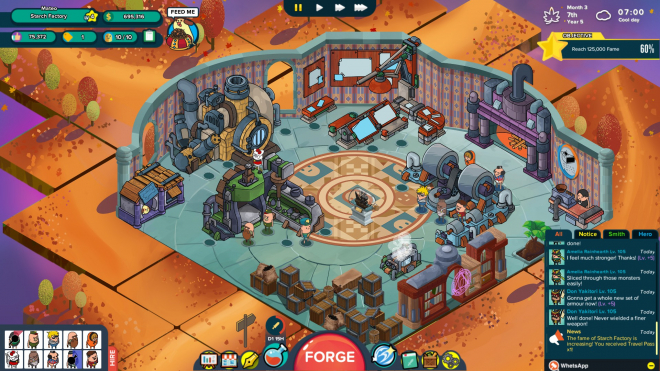
This game is a very decent casual shop management simulator. It's a game that if you have time to kill you may enjoy it. I found that after a few hours I had mastered the simple activities I needed to do to beat the game. Explore or buy materials, research new weapons, make weapons with certain traits, sell weapons to specific people, make money, rinse, repeat. Smith becomes unhappy? Send them on vacation. Want a better smith? Fire the ones that you don't like and hire new ones. Smiths not doing well but don't want to hire new ones? Send them to train up. Do side contracts to fill the void while your merchant is selling or explorer exploring or smith vacationing. Once you have the rhythm and know-how the game is rather difficult to lose. The first time playing I didn't pay attention very well, so I ended up going bankrupt. You do get penalized for not making money, but it's really difficult to not make copious amounts of money quite early on.
In the end I found this game to be fine. It was a fun game to fill my free time, but it isn't a game I would reach for time and again. I found myself being bored near the end since I was doing the same thing I had for 10 hours. It's extremely casual, it's family friendly, it's heavy handed on the humor, and packed full of puns and references to other movies, games, and books. If it's on sale pick it up for a casual play-through. It may be a good way to teach resource, time, money, and people management to kids if used correctly. I might play again with my kids later, but probably won't play it again otherwise. Not worth full price, but definitely worth it if on sale.
AUTHOR INFORMATION

 The music is fine. It's repetitive and becomes white noise after a while.
The music is fine. It's repetitive and becomes white noise after a while.
 Once you learn how the game plays, it's a matter of doing the same, just with bigger numbers.
Once you learn how the game plays, it's a matter of doing the same, just with bigger numbers.
 The management aspect is repetitive, but well balanced.
The management aspect is repetitive, but well balanced.
 For a shop management game the story is pretty fun and has interesting plot twists.
For a shop management game the story is pretty fun and has interesting plot twists.
 The controls are super simple to learn and master, but it becomes monotonous after a while.
The controls are super simple to learn and master, but it becomes monotonous after a while.
PROS / CONS
- Variety of weapons
- Humor
- Character variety
- Character Happiness Management
- Gameplay Variety
- Repetitious
- Grindey
- Hyper linear progression
- Inventory Management
- Unchanging Music

